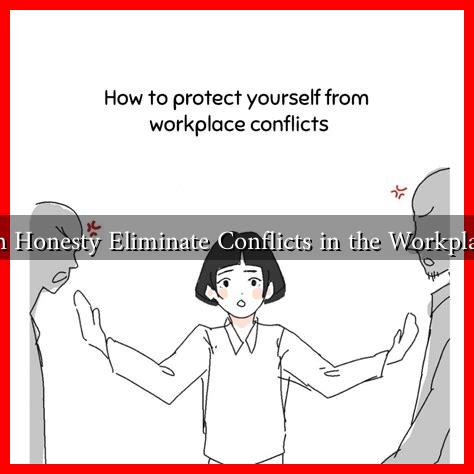-
Table of Contents
- Can Honesty Eliminate Conflicts in the Workplace?
- The Importance of Honesty in the Workplace
- Building Trust Through Transparency
- Case Studies: Honesty in Action
- 1. Buffer
- 2. Zappos
- Strategies for Fostering Honesty
- Challenges to Honesty in the Workplace
- Conclusion: The Path to Conflict-Free Workplaces
Can Honesty Eliminate Conflicts in the Workplace?
Workplace conflicts are an inevitable part of organizational life. They can arise from differences in opinions, work styles, or even personal values. However, one of the most effective tools for mitigating and potentially eliminating these conflicts is honesty. This article explores the role of honesty in conflict resolution, supported by research, examples, and practical strategies.
The Importance of Honesty in the Workplace
Honesty is often touted as a cornerstone of effective communication and collaboration. In a workplace setting, it fosters trust, transparency, and accountability. When employees feel they can express their thoughts and concerns openly, it creates an environment conducive to problem-solving and innovation.
Building Trust Through Transparency
Trust is essential for any team to function effectively. According to a study by the American Psychological Association, organizations with high levels of trust experience:
- Increased employee engagement
- Higher productivity
- Lower turnover rates
When honesty is prioritized, team members are more likely to share their ideas and feedback without fear of retribution. This openness can lead to a more cohesive team dynamic, reducing the likelihood of misunderstandings that often escalate into conflicts.
Case Studies: Honesty in Action
Several organizations have successfully implemented honesty as a core value, leading to reduced conflicts and improved workplace culture. Here are a couple of notable examples:
1. Buffer
Buffer, a social media management platform, is known for its radical transparency. The company openly shares its salaries, revenue, and even its decision-making processes with employees. This level of honesty has fostered a culture of trust and collaboration, significantly reducing conflicts related to compensation and career advancement.
2. Zappos
Zappos, an online shoe and clothing retailer, emphasizes open communication and honesty in its corporate culture. The company encourages employees to voice their opinions and concerns, which has led to a more harmonious workplace. Zappos reports that this approach has not only minimized conflicts but also enhanced employee satisfaction and loyalty.
Strategies for Fostering Honesty
While honesty can significantly reduce workplace conflicts, it must be cultivated intentionally. Here are some strategies organizations can implement:
- Encourage Open Dialogue: Create forums for employees to express their thoughts and concerns without fear of judgment.
- Lead by Example: Leadership should model honesty in their communications and decision-making processes.
- Provide Training: Offer workshops on effective communication and conflict resolution to equip employees with the skills they need to engage honestly.
- Establish Clear Policies: Develop guidelines that promote transparency and accountability within the organization.
Challenges to Honesty in the Workplace
Despite its benefits, fostering honesty can be challenging. Some common obstacles include:
- Fear of Repercussions: Employees may hesitate to speak up due to fear of negative consequences.
- Cultural Norms: In some organizations, a culture of silence may prevail, making it difficult for honesty to take root.
- Lack of Training: Without proper training, employees may struggle to communicate their thoughts effectively.
Conclusion: The Path to Conflict-Free Workplaces
While honesty alone may not eliminate all conflicts in the workplace, it is a powerful tool that can significantly reduce their frequency and intensity. By fostering a culture of transparency and open communication, organizations can build trust among employees, leading to a more harmonious work environment. As demonstrated by companies like Buffer and Zappos, prioritizing honesty can transform workplace dynamics, ultimately enhancing productivity and employee satisfaction.
In summary, honesty is not just a moral imperative; it is a strategic advantage in conflict resolution. By implementing the strategies outlined above, organizations can pave the way for a more collaborative and conflict-free workplace.
For further reading on the importance of honesty in the workplace, you can visit Forbes.

